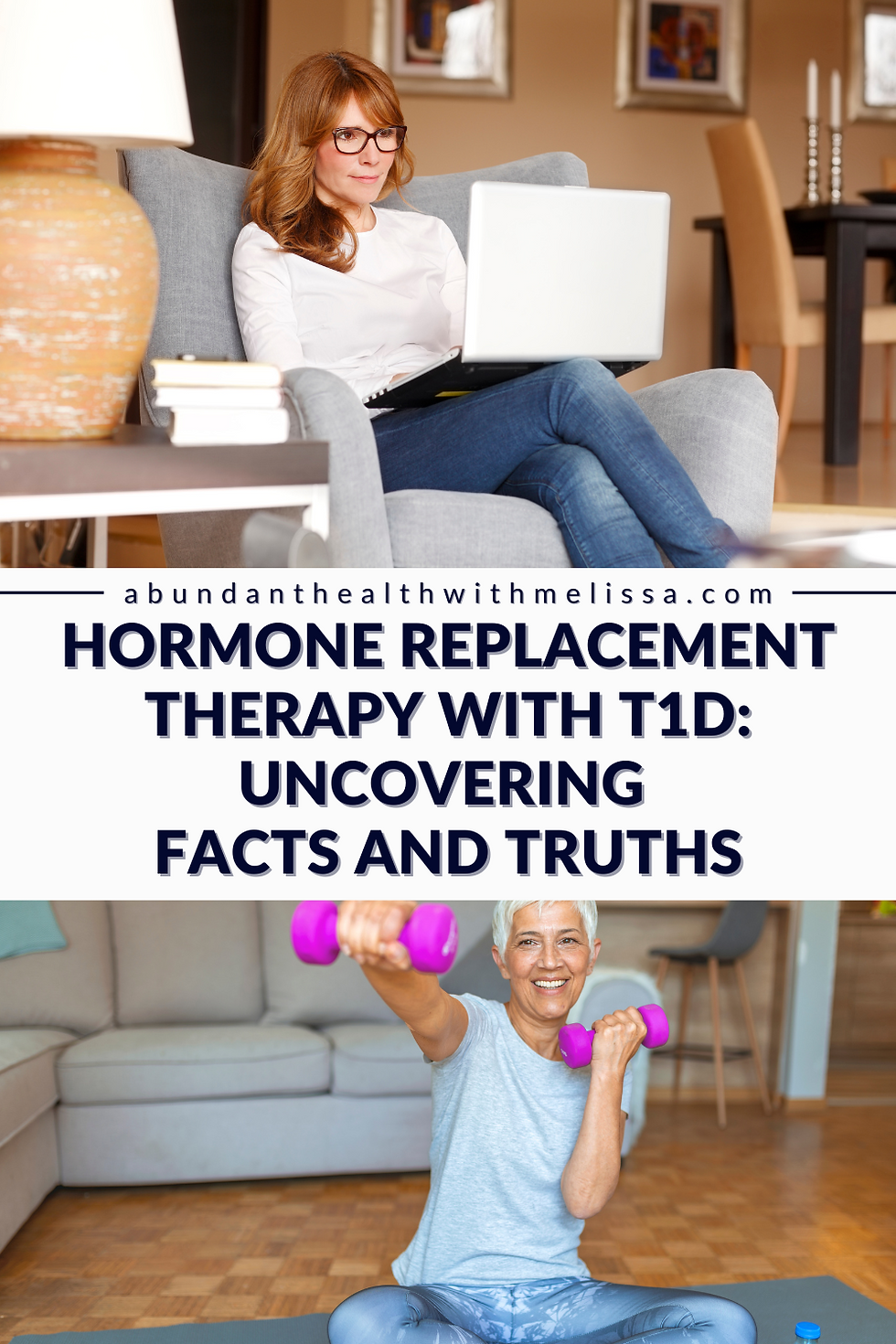Hormone Replacement Therapy with T1D: Uncovering the Facts and Truths
- Melissa Slemp

- Nov 30, 2023
- 4 min read
Updated: May 20, 2024
As I reflect on my journey through the challenges of midlife, managing type 1 diabetes took an unexpected turn with the onset of perimenopause. Traditional solutions fell short, leaving me frustrated and confused as doctors struggled to explain sudden changes in insulin needs and unexplained weight gain.
Turning to holistic nutrition studies with the Institute for Integrative Nutrition (IIN), as well as into hormone replacement therapy with T1D, was a particularly relevant endeavor.
Timing proved perfect as I uncovered connections between insulin, estrogen, progesterone, cortisol, and vitamin D3, unraveling their impact on my blood sugar and menopausal symptoms.
In this free guide, learn what to expect when estrogen levels drop
Understanding these changes became vital for me to regain balance. Exploring why I developed insulin resistance during hormonal shifts led me to focus on my lifestyle and stress reduction.
Hormone replacement therapy (HRT) was the final piece that restored my path as a woman managing diabetes and continues to help me thrive in post menopause.
My personal experience overcoming a common yet often overlooked challenge was to determine if HRT is safe for those of us managing type 1 diabetes. This inspired a discussion with Dr. Tabatha Barber, a triple board-certified physician in obstetrics, gynecology, menopause, and functional medicine. She shared important advice every woman managing type 1 diabetes throughout midlife should know.
In this podcast interview, Dr. Tabatha Barber, who overcame her own adversity, imparts invaluable insights into foundational health to support hormonal changes, and the potential benefits of hormone replacement therapy.
Starts With Foundational Health
Dr. Barber reshapes the approach of midlife women managing type 1 diabetes, highlighting the importance of basic health choices for overall well-being and blood sugar control.
Navigating Perimenopause: Key Areas for Women to Focus On
Clean Up Your Diet and Environment: Avoid plastic and processed foods to reduce toxic exposure. Improve water quality through filtration. Verify and reduce consumption from plastic containers and bottles.
Prioritize Sleep: Aim for a consistent eight hours nightly to support overall health.
Incorporate Regular Physical Activity: Especially crucial during menopause, as it regulates blood sugar and supports overall well-being. Discover why yoga is such a powerful wellness tool for diabetes management.
Ensure Basic Supplementation: Counteract nutrient depletion in modern diets and soil with essential supplements.
Adrenal Health Focus: Recognize the post-menopausal shift and prioritize adrenal well-being. Evaluate stress levels and implement practices like meditation, breathing techniques, or tapping to enter parasympathetic mode.
Listen in to my full interview with Dr. Tabatha Barber, and learn how reproductive hormones, cortisol, and insulin, affect both health and the gut microbiome.
The Truth About Hormone Replacement Therapy with T1D
Dr. Barber challenges the dismissal of menopausal challenges as "natural," highlighting the need for individualized decisions, whether optimizing health without hormones or considering bioidentical hormone replacement. It's important to know, Bio-Identical Hormone Replacement Therapy, unlike synthetic alternatives, is plant-based and binds to receptors like a key to a lock.
To ease the transition and promote long-term well-being, it's crucial to support adrenal health. Additionally, understanding the role of DHEA (Dehydroepiandrosterone) in menopause is essential.
DHEA is a hormone produced in the adrenal gland that helps create other hormones like testosterone and estrogen. Natural DHEA levels peak in early adulthood and gradually decline with age. (Mayo Clinic Aug 2023)
In her article "You Want To Know The Truth About Hormone Replacement Therapy?" Dr. Tabatha Barber shares these key takeaways:
Thorough testing is crucial for tailoring care, utilizing various testing methods.
There are experts unafraid of delving into hormonal understanding.
Tune in to your body, heed its signals, and restore balance for optimal functionality.
You don't have to endure unnecessary suffering, even if you consider yourself "older" like me!
A century ago, women faced mortality in their 50s, but now it's recognized as the prime stage of life.
Embracing Dr. Tabatha Barber's holistic approach serves as a comprehensive guide for midlife women managing type 1 diabetes. From foundational health to specific insights on gut health, hormones, and stress management, Dr. Barber's wisdom empowers women to take control of their well-being and navigate the complexities of midlife health with confidence.
Understanding these changes was crucial for me to regain balance. Exploring insulin resistance during hormonal shifts led me to focus on lifestyle and stress reduction. Hormone Replacement Therapy (HRT) became the key that restored my journey as a woman managing diabetes, allowing me to thrive in post menopause.
My personal journey tackles a common yet overlooked challenge discussing the safety of HRT for those with type 1 diabetes. Armed with facts, I consulted my doctor about the appropriateness of hormone replacement. Considering the possibility of discontinuing HRT, Dr. Barber's insights convinced me of its long-term safety and the positive impact on both physical and emotional health.
Please seek your doctor's advice on the best tests and treatment options for you.
Download your guide "Thrive with Type 1 Diabetes After 40" and kickstart your journey to thriving in midlife with diabetes management!
Don't forget to Pin this post...








Comments